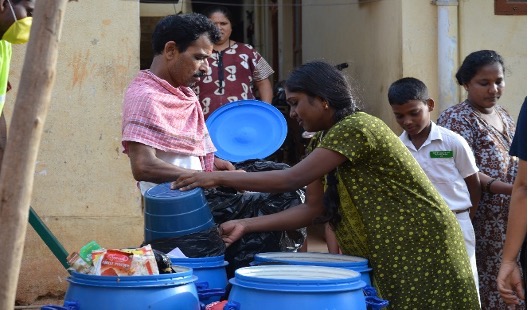VEDAN TRUST
MARKET WASTE MANAGEMENT
“What is waste to one person is an asset to another when given at the right
time and in the required manner”
Vegetable markets play a vital role in supplying fresh produce to urban populations, but they
also generate significant amounts of waste, posing environmental and public health challenges.
The key strategies for effective waste management in vegetable markets include source
segregation, composting of organic waste, recycling, educational outreach programs and
segregation practices among vendors and consumers. Additionally, community engagement
and interdisciplinary collaboration among government agencies, NGOs, businesses is
emphasized in implementing successful waste management initiatives.
Read More…
Garbage generated in Bengaluru’s markets big and small can be a star. Named G-Star
(GARBAGE as a STAR), the suggested model, brings together people who produce waste and
those who can make productive use of it. The G-star model can reduce the mixed waste that
goes to landfills. This waste can be distributed to all stakeholders in a desired form by collecting
it directly from vendors at the market as and when it is produced.
Contact us for Market Waste management – (this link will open up in new browser –
Business Enquiry Form)
Read Our Stories..
“Seeds of Change: Sowing Sustainability in K R Puram’s Vegetable Market Waste” –
KRISHNARAJAPURAM (KR) PURAM MARKET, BENGALURU
The BBMP-owned Krishnarajapuram (KR Puram) market, one of the biggest in the City and
is a busy, vibrant and a crowded market in the heart of Bengaluru City (Ward 55). It has given
livelihood for hundreds of vendors and farmers. There are about 150+ vendors in the market
generating 1000kg/day of waste on an average. Large number of livestock farming and cows
can be seen near the market. These are the positive aspects of the market that can be used for
the waste management of the market, but is in a shambles due to poor maintenance and lack of
proper amenities. Shopkeepers and visitors to the market spread across five acres have to bear
with uncleared garbage, drains filled with muck and all-pervading stench. The dismal condition
has been persisting for years.
Intensive study of the market, Vendor awareness sessions, provision of infrastructure,
dedicated cow feeding area and diversion of fruit/vegetable waste to orphanages, piggeries and
goshalas, fostered a culture of responsible waste management in the market.
IMPACT
o 1000kg/day of waste diversion from landfill
o »Rs. 70,000/- BBMP cost of waste handling saved
o Better life (Plastic-free food) for animals
o 150+ vendors sensitized on waste management
Read More:
There are about 150+ vendors of wholesale and retail fruits/vegetables, retail fruits/vegetables.
Around 100-200kg/day of dry waste and 7000-10,000kg/day of wet waste is generated.
Pre-Existing System:
All the left over waste is swept, collected in autos and dumped to dump trucks mixing up with
other wastes. Pourakarmikas worked only 6 hours for 5 days and 4 hours for 2 days a week
wherein there was a requirement of 12hours of cleaning leading to creation of blackspots. The
sad direct consequence of mixed waste is obvious where one can notice cows ingesting plastic
and other waste while grazing on fruit/vegetable leftovers.
Implemented Methodology:
Media Coverage
(to add – need data ) – kannada Prabha – to share
Intensive Study of the Market – Survey, data collection
Information, Education, Communication (IEC) – vendors
Provision of Infrastructure – bins and cow feeding tubs,
trolleys, crates
Wall Beautification of cow feeding area
Leftover fuits/vegetable collection by orphanages, piggeries
and goshalas
Photos
Main Photos – to slide
For Photo Gallery
Add pics giving letter
Testimonial
(to add- need data) – add letter from vendors
“Branching Out for a Better Environment: Yeshwanthpur Market’s Waste Revolution” –
YESHWANTHPUR MARKET, BENGALURU
The market is in Ward 37, a small market consisting of 285+ shops generating about 700-
1000kg of wet waste per day creating multiple blackspots due to mis-management of waste.
Infrastructure like waste collection bags and units, awareness and change in the Standard
Operating Procedure turned the market into a beautiful market in Bengaluru.
IMPACT
o 250-300kg/day of wet waste diverted to cows and goshalas
o 200kg/day wet waste diverted to gas plant
o 285+ shopkeepers sensitized on waste management
Read More:
There are about 285+ shopkeepers in the market. Around 150-200kg/week of dry waste and
700-10,00kg/day of wet waste is generated.
The same conditions pre-existed as that of K R Puram market and the same methodology
derived from the pilot study of K R Puram Market were implemented to turn the market into
an efficient waste management market in the city. Read here about the Pre-existing system and
Implemented Methody of K R Puram Market (give the link which re-directs to page “Read
More of K R Puram).
Photos
Main Photos – to slide
For Photo Gallery
“Harvesting Change: Turning Madiwala Market’s Trash into Treasure” – MADIWALA
MARKET, BENGALURU
Madiwala Market is a busy market located in ward 151, giving livelihoods for hundreds of
vendors and farmers. 400+ shops and other vegetable sellers generate about 7,000 to
12,000kg/day. Inefficient waste management created 7 major blackspots and animals can be
noticed eating plastics along with vegetable/fruit waste while grazing food.
As a part of Vedan’s efforts, the leftover fresh produce is diverted to orphanages. Wet waste is
collected by the piggeries, cow and sheep owners, Flower waste is sent for the production of
incense sticks, the remaining wet waste is collected in a composting unit and dry waste is sent
to recycling. All the wastes are collected in trolleys directly from vendors and stored at the
Waste Collection Centre which acts as a focal point for its distribution. This market is now an
inspiring model to all other markets in the city. Indian Institute of Public Administration, New
Delhi visited Madiwala Market to understand the system implemented and appreciated the
team efforts.
IMPACT
o 95% of waste segregation
o 1000-1300kg/day of waste diversion to cows and piggeries
o 400+ vendors sensitized on waste management
o 7 major blackspots eliminated
o 250+ people benefitted from health camps
o 6000 paper cups/day replaced by steel cups
o Reduced Ergonomic strain of PKs by provision of easy-to-handle trolleys and asphalted
farmers’ shed
o Provision of amenities to PKs – place to dine, first aid box, drinking water, toilets etc
o Parking space allotment by Traffic police and Plantation by Horticulture Department
Read More:
Around 400+ shops in the market and several farmers add to the waste generation in the market
as show below.
SL. NO. TYPE OF WASTE TOTAL WASTE
1.
Wet waste
• Lean Period (Dec to May)
• Peak Period (June to Nov)
7000 to 12,000 Kg /day
18,000 Kg/day to 22,000 Kg/day
2. Dry waste 200 to 500 Kg/day
Plan of Action:
Social Venture Partners India (SVP India) played a key role in moving things forward from
the political front, bringing in all the stakeholders and providing infrastructure such as crates,
trolleys, sheds and bins.
Media Coverage
Bengaluru: Good-quality greens left behind at Madiwala market go to poor – The Times of
India
Pourakarmika Planning –
Roaster Management
Setting up Waste
Aggregation Centres
Stakeholder
Management – Market
President, Vendors,
Cosporator, MLA, BBMP,
Working Partners,
Cow/Piggery Owners
Vendor Awareness
sessions
• Capacity Building of
Supervisors and
Pourakarmikas
Distribution of bins and
crates to vendors &
trolleys to Pourakarmikas
• Market Beautification
Collection of waste and
storgae in Waste
Aggregation Centres
Waste Collection by
Piggeries/ Cow owners
Madiwala market’s journey of managing its waste problem – Citizen Matters
Photos
Main Photos – to slide
For Photo Gallery
Links
Madiwala Market Waste Management – Instagram
save Leaf, Save Farmer’s Produce & Avoid The Waste Being Buried At Landfill – Youtube
SWM at the Madiwala Market – case study presented by Padmashree Balaram – Youtube
Choose to Reuse – Madiwala Market – Instagram
Cattle & Piggery Owners collection waste from Madiwala Market – Instagram
Testimonial



